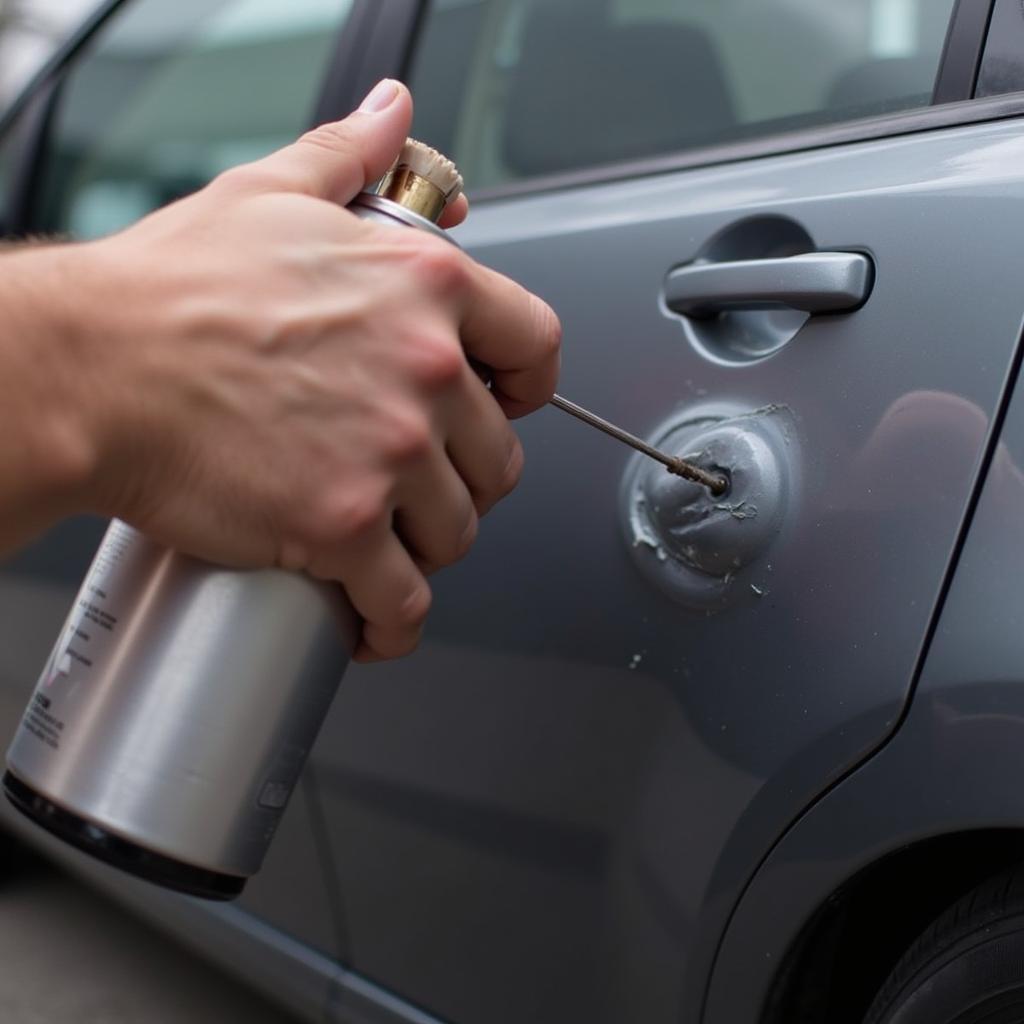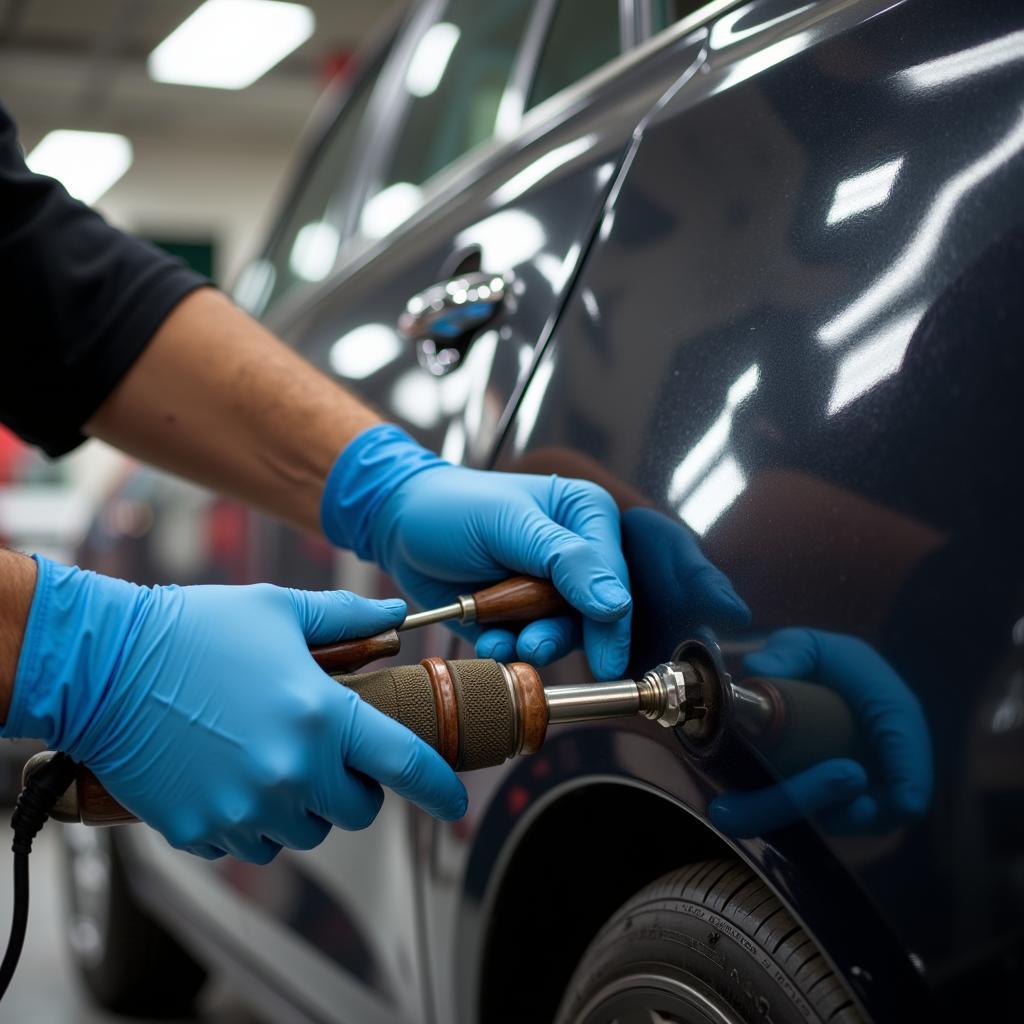Fixing a dent in your car can be an expensive and time-consuming process. So, when you hear about a DIY method using something as simple as compressed air, it’s natural to be intrigued. But can you really fix a dent in your car with compressed air? This article will explore this popular method, examining its effectiveness and potential risks.
Understanding Dents and How They Happen
Before we delve into the compressed air method, it’s essential to understand what a dent is and how it affects your car’s body. A dent is essentially a deformation of your car’s metal surface caused by an impact. This impact could be from anything like a minor fender bender, a rogue shopping cart, or even hail.
The severity of a dent can vary greatly. Some dents are shallow and purely cosmetic, while others can be deep, affecting the car’s structural integrity. The type of dent determines the best repair method.
 Compressed Air Dent Removal
Compressed Air Dent Removal
The Compressed Air Method: Does It Really Work?
The idea behind using compressed air to fix a dent is based on the principle of rapidly changing temperatures to manipulate the metal. The theory suggests that alternating between hot and cold temperatures will cause the metal to expand and contract, potentially popping the dent back out.
Here’s how the method is often described:
- Heat the dent: Use a heat gun or a hairdryer on a high setting to heat the dented area for a minute or two.
- Apply compressed air: Immediately after heating, hold a can of compressed air upside down and spray the dented area for several seconds. The rapid cooling is thought to contract the metal.
While this method seems straightforward, its effectiveness is highly debated.
Here’s the catch:
- Limited success: While there might be anecdotal evidence of minor, shallow dents being fixed with this method, it’s crucial to understand that its success rate is very low.
- Type of dent matters: This method is highly unlikely to work on deep dents or dents on reinforced areas of your car’s body.
- Risk of damage: Applying extreme temperatures to your car’s paint can cause damage, such as cracking or discoloration.
 Car Dent Repair Shop
Car Dent Repair Shop
When Compressed Air Can Be Useful
While using compressed air as the primary method for fixing a dent is debatable, it can be helpful in certain situations:
- Removing dust and debris: Before attempting any dent repair, using compressed air to clean the area thoroughly is recommended. This ensures better adhesion if you’re using a suction cup or glue-based dent puller.
- Drying after cleaning: After washing your car or using a cleaning solution for dent repair, compressed air can help dry the area quickly, preventing water spots.
Effective Alternatives for Dent Repair
If you’re dealing with a dent in your car, it’s best to consider proven and effective repair methods:
- Paintless Dent Repair (PDR): This technique is highly effective for minor dents and dings. A trained technician uses specialized tools to massage the dent out from behind the panel, preserving the original paint job.
- Suction Cup Dent Pullers: For small, shallow dents, suction cup dent pullers can be a DIY option. These tools create a vacuum to pull the dent out.
- Body Filler and Repainting: Deeper dents might require the use of body filler to even out the surface followed by sanding, priming, and repainting. This method is more involved and usually handled by professional body shops.
how to fix a sticking ac car vent.door
Expert Insight
“While the internet is full of DIY car repair hacks, it’s crucial to approach them with caution,” says John Miller, a seasoned automotive engineer with over 20 years of experience. “The compressed air method for dent repair is a prime example of a method that sounds good in theory but rarely delivers in practice. It’s always best to consult with a professional, especially for anything beyond minor cosmetic imperfections.”
Making the Right Call
Attempting to fix a dent in your car with compressed air is unlikely to yield satisfactory results and might even cause further damage. It’s best to assess the severity of the dent and choose the most appropriate repair method.
If you’re unsure about the best course of action, don’t hesitate to consult a reputable auto body repair shop. They can assess the damage and recommend the most effective and cost-efficient solution. Remember, when it comes to your car’s appearance and safety, professional expertise is invaluable.
Need help with a dent or any other car issue? Contact AutoTipPro at +1 (641) 206-8880 or visit our office at 500 N St Mary’s St, San Antonio, TX 78205, United States. Our team of experts is here to provide reliable and efficient solutions for all your automotive needs.




Leave a Reply